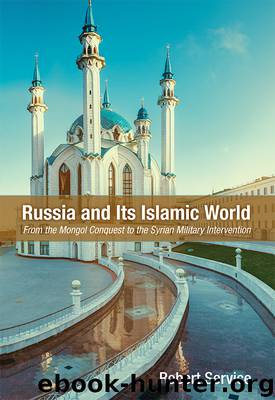Russia and Its Islamic World by Service Robert

Author:Service, Robert
Language: eng
Format: epub
Tags: Russia, Islam, Muslims, Middle East, Russian Federation, Soviet Union, Moscow, Cold War, Global affairs, Russian expansion
Publisher: Hoover Institution Press
Published: 2017-03-16T16:00:00+00:00
7
* * *
Dealing with the “Near Abroad”
YELTSIN UNEXPECTEDLY STOOD DOWN FROM OFFICE at the end of 1999 and made Putin the acting president until such time as an election could be held. Putin easily secured victory at the polls and made clear his intention to provide firm leadership to restore order in Russia and regain the country’s status as a great power. He quietly let it be known that he blamed Yeltsin for the disorderliness that persisted in the economy and public affairs.
On relations with the other ex-Soviet republics, however, there was continuity in policy. The Belovezha Forest accords signed by Yeltsin, Kravchuk, and Shushkevich on December 8, 1991, involved an agreement to create a Commonwealth of Independent States involving as many ex-Soviet republics as desired to belong. Armenia, Azerbaijan, Kazakhstan, Kyrgyzstan, Moldova, Turkmenistan, Tajikistan, and Uzbekistan committed themselves at an Almaty meeting thirteen days afterward. (Kazakhstan’s Nazarbaev had by then become an enthusiast for the USSR’s abolition.) Notable by their rejection of the opportunity to join the new commonwealth were the Baltic states of Estonia, Latvia, and Lithuania, as well as Georgia in the south Caucasus. Yeltsin had personally recognized the right of Soviet republics to their independence even before the USSR ceased to exist. He worked from the assumption that the Russian Federation would in some way or another succeed in dominating the territories that had been under Russian control for centuries. He was also determined that, sooner or later, Russia would achieve a political and economic recovery that would reestablish the country’s status as a great power.
Yeltsin looked with concern at the “near abroad”—the term for other countries of the former Soviet Union. When Gorbachëv and Shevardnadze were arranging for the Soviet Army’s withdrawal from Afghanistan, they warned the Americans about the danger of giving support to mujahidin; they had learned that jihad could acquire a life of its own and run out of control. The Islamist irregulars, despite being worse armed than Moscow’s forces, had seen off the Soviet occupation—and religious fanaticism had provided a sharp edge. Afghan communist leader Mohammad Najibullah tumbled from power in 1992. After a bitter civil war, the fanatical Islamist Taliban under Mullah Muhammed Omar swept into power in Kabul four years later. This was not an outcome that Yeltsin could regard with equanimity as fears grew that jihadism might seep across the Afghan border into Tajikistan and beyond. Yeltsin provided support to the Afghan military leader Ahmad Shah Massoud in the civil war that was tearing Afghanistan apart. Massoud headed a force of mujahidin who had fought against the Soviet occupation, but his brand of Islamic fundamentalism was markedly more moderate than that of the Taliban under Mullah Omar. The Taliban reacted by declaring a jihad against Russia. Omar’s statements were alarming even though he lacked the resources to put his threats into action.
The Commonwealth of Independent States was a formal arrangement, having no linkages that interfered with each member country’s capacity to do as it liked within its borders.
Download
This site does not store any files on its server. We only index and link to content provided by other sites. Please contact the content providers to delete copyright contents if any and email us, we'll remove relevant links or contents immediately.
| Elections & Political Process | Ideologies & Doctrines |
| International & World Politics | Political Science |
| Public Affairs & Policy | Specific Topics |
| United States |
The Secret History by Donna Tartt(19088)
The Social Justice Warrior Handbook by Lisa De Pasquale(12190)
Thirteen Reasons Why by Jay Asher(8910)
This Is How You Lose Her by Junot Diaz(6887)
Weapons of Math Destruction by Cathy O'Neil(6280)
Zero to One by Peter Thiel(5802)
Beartown by Fredrik Backman(5754)
The Myth of the Strong Leader by Archie Brown(5507)
The Fire Next Time by James Baldwin(5446)
How Democracies Die by Steven Levitsky & Daniel Ziblatt(5219)
Promise Me, Dad by Joe Biden(5153)
Stone's Rules by Roger Stone(5088)
A Higher Loyalty: Truth, Lies, and Leadership by James Comey(4964)
100 Deadly Skills by Clint Emerson(4925)
Rise and Kill First by Ronen Bergman(4789)
Secrecy World by Jake Bernstein(4753)
The David Icke Guide to the Global Conspiracy (and how to end it) by David Icke(4720)
The Farm by Tom Rob Smith(4512)
The Doomsday Machine by Daniel Ellsberg(4490)
